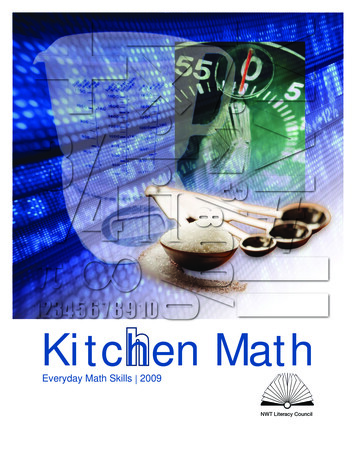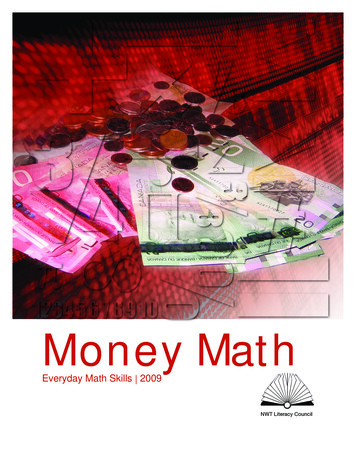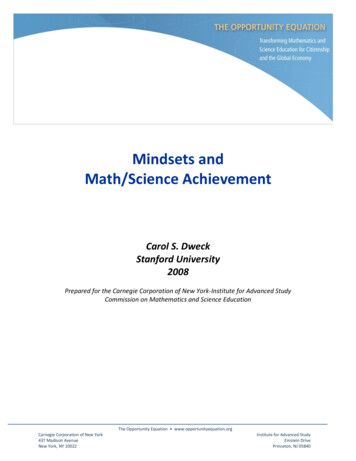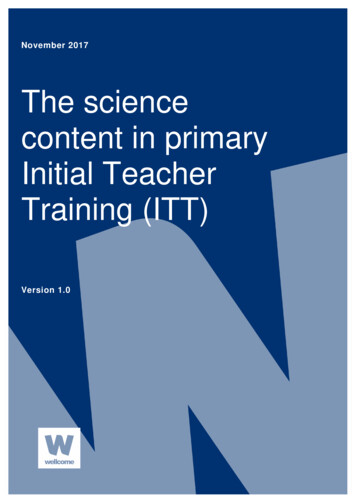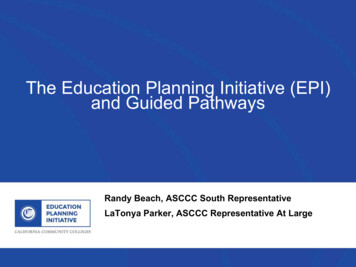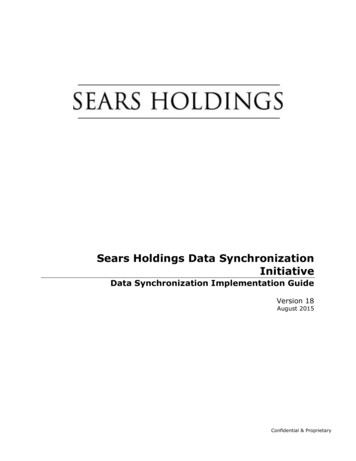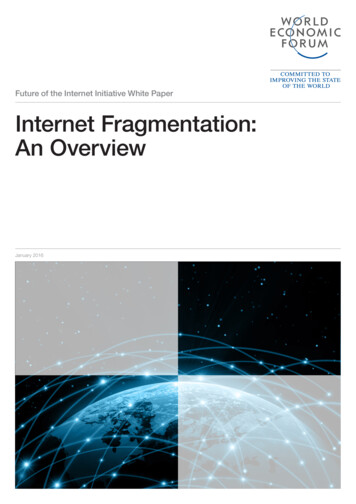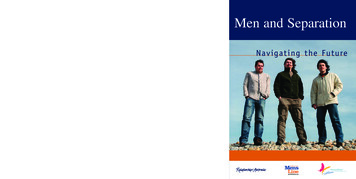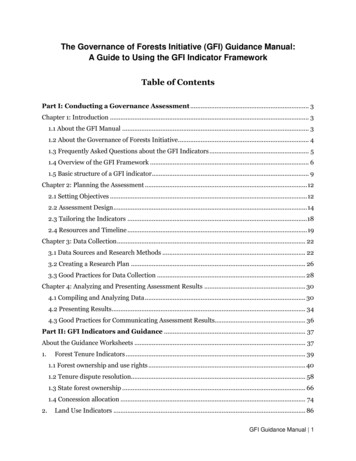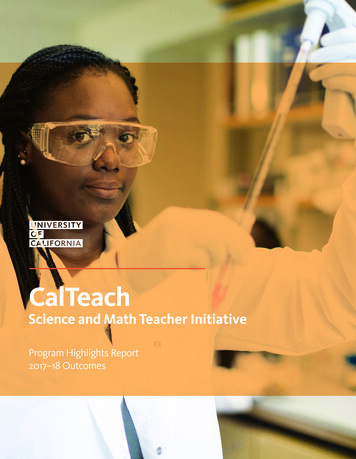
Transcription
CalTeachScience and Math Teacher InitiativeProgram Highlights Report2017–18 Outcomes
OV E RV I E W The University of California Science and MathTeacher Initiative, also known as CalTeach, helps to addressCalifornia’s shortage of well-qualified K–12 mathematics andscience teachers by improving California’s undergraduatepipeline to mathematics and science teaching credentials.California’s position as a global leader in technology and innovation is challenged bya shortage of the math and science teachers needed to prepare future generationsfor the workforce.1 Several factors contribute to this shortfall, which is nationwide inscope and is expected to worsen. These include significant decreases over the lastfew years in the number of people pursuing teaching credentials, in California andbeyond; a projected wave of teacher retirements; and increasing K–12 enrollment inthe near future.The CalTeach program was launched by UC in 2005 to address the state’s need forqualified teachers. CalTeach recruits and prepares talented undergraduates to explorecareers as math or science educators. Housed at all nine of UC’s undergraduatecampuses — Berkeley, Davis, Los Angeles, Irvine, Merced, Riverside, San Diego,Santa Barbara and Santa Cruz — programs invite students majoring in math orscience to add a sequence of CalTeach courses and fieldwork experiences thatintroduce them to teaching while they complete undergraduate degrees. Thesecourses, together with research opportunities and hands-on experience in K–12classrooms, complement participants’ discipline-specific studies and prepare themto seek a teaching credential along with their B.A.F E AT U R E SCalTeach gives students the skills and experience to pursue a teaching credential.Participants learn and practice conceptual teaching skills in courses held at localK–12 classrooms and through field experiences and summer internships at localschools. Mentor teachers oversee participants in K–12 math and science classrooms.Most CalTeach programs also offer a minor or concentration in math and/or scienceeducation that focuses on teaching those subjects.Three UC campuses — Berkeley, Irvine and Los Angeles — offer accelerated credentialprograms that provide CalTeach students with two options: earn a teaching credentialalong with the baccalaureate degree, or combine the last year of undergraduatestudies with the first year of credential studies.In collaboration with UC faculty and graduate students, CalTeach programs alsosponsor research that contributes to our understanding of effective practices formath and science education. Sample research topics include CalTeach graduates’preparedness for teaching, the effect of field experiences on attitudes towardteaching and public education, and effective methods for tracking the CalTeachgraduates who enter teaching careers.1Linda Darling-Hammond, Leib Sutcher and Desiree Carver-Thomas, Teacher Shortages in California:Status, Sources, and Potential Solutions (Palo Alto, CA: Learning Policy Institute, 2018).CalTeach reaches students and schoolsthroughout the state. Since itsinception, more than 15,000UC undergraduate students haveexplored careers in teaching math orscience through CalTeach. Of these,roughly 2,000 CalTeach participantshave gone on to receive single-subjectmath and science credentials, andmore than 1,700 CalTeach alumnihave pursued teaching in California’spublic schools.“CalTeach was an integral part of mypath to becoming a STEM educator.The program offered preparationfor the teaching exams, invaluableclassroom experience and extensiveprofessional development. Thanksto this program, I am now workingon a secondary math teachingcredential and a master’s of educationat UC Riverside, fulfilling my dreamof becoming a teacher.”SAVANNAH SPRAGUEALUMNA, UC RIVERSIDE CALTEACH
“The CalTeach program allows undergraduates toget meaningful classroom experience in order toconfirm that a teaching career is right for them.They enter teacher training programs betterprepared than non-participants. I have witnessedoutstanding teachers in our district who hadtheir start at CalTeach. The students, their hostteachers and instructors, and, ultimately, thecommunity all benefit from CalTeach. I am happyto be a donor to this wonderful program.”VIVIAN MOUTAFIANMENTOR TEACHER, UC SANTA CRUZ CALTEACHTEACHER, WATSONVILLE HIGH SCHOOL“The partnership between UC Merced and UCBerkeley allows students to earn their bachelorof science degree and step into a classroom witha teaching certificate. Our students benefit as theyadvance their academic and career goals. We benefitas these talented and diverse scholars are nowteaching in our classrooms. CalTeach is creatingeducational transformation in the Central Valley.”CHARLES T. NIESVICE CHANCELLOR, STUDENT AFFAIRSUC MERCEDP RO G R A M O F F E RI N GSCalTeach provides a rich array of academic andcareer preparation opportunities for studentsinterested in pursuing a math or science teachingcredential. Its components are grounded incurrent research on the best practices in teacherpreparation. Although campus programs havedistinct approaches to teacher preparation,common features across CalTeach programs include: Equity in STEM teaching and learning Recruiting and advising Coherent curriculum Field experiences and mentor teacher support STEM partnerships Teacher professional growth experiences Ongoing program evaluation and research Faculty leadership, collaboration and research
Y E A R I N R E V I E W In 2017–18, CalTeach continued to expand its recruitment and preparationof UC undergraduates for careers as math or science teachers. Despite statewide decreases in thenumber of people entering the teaching profession, participation in CalTeach continues to flourish.2017-18The following sections provide an overview of the program’srecent achievements.2016-17I M PAC T2017-182,109 participants2016-171,960 participants1,882 participants2015-162013-141,731 participants2012-131,736 participants2,688 course enrollment2013-14In 2017–18, 174 CalTeach graduates pursued a math or science2,471coursepublicenrollment2012-13 at a TEP offered at one of thecredentialstate’sinstitutionsof 2011-12higher education. Of those, 1102,386(63 percent)enrolled in acourse enrollmentUC TEP.CSU TEPenrollment2,688 course enrollment2013-14CalTeach graduates pursuing math or science credentialsparticipantsare2013-14enrolling in teacher education1,731programsacross the1,736 TeacherparticipantsEducation2012-13state,and many are enrolling in UC’sPrograms (TEPs)UC TEPenrollment1,658 participants2014-151,658 participants2014-15Since its inception, more than 15,000 UC undergraduate studentshave participated in a CalTeach program on one of nine UCcampuses. In 2017–18, CalTeach total student participation was2,109, the highest annual enrollment in the program’s history.58 math52 science43 math21 science2,471 course enrollment2012-132011-12CalTeach1,882 participants2015-16CalTeach continues to grow2,109 participants1,960 participantsgraduates are2,386 mathcourse enrollmentearningand scienceteaching credentialsIn 2017–18, 827 math, science and multi-subject credentials were awarded to alumni of the CalTeach program.58 mathTEPThisUCincreaseis in alignment with the growing number of participants in recent years.computerenrollmentnumber of credentials800CSUTEPenrollmentinterdisciplinary/ science (23)multiple STEM (79)52 sciencetotalengineering (82)43 mathBuilding the next generationof education leadersbiological/life21 scienceother STEM (187)600400sciencephysicalmathematicssciences (203)computerinterdisciplinary/200 multiple STEM (79) science (23)sciences (395)Through 2017–18, 55 CalTeachalumnihave1,393goneon to earn an administrativeCalTeachSTEM undergraduatesservicescredential, a prerequisite forby majorbecominga K–12 school administrator.2015–16multiple-subjectengineering (82)2006-07other STEM (187)to 2017-18mathematics/statistics (424)biological/lifesciences (395)1,393A significant proportionofCalTeachUC baccalaureates who go on to earn a math or scienceSTEM undergraduatescredential have participatedin CalTeach. In 2017–18, CalTeach alumni earned moreby major2015–16than 21percent of all mathand science single-subject credentials awarded in California.physicalMultiple-Subject Credentialssciences (203)Math & Science Single-Subject CredentialsCalifornia3,000mathematics/statistics (424)California8,0006,0002,0004,0001,0005002006-07 to 2017-18CalTeach2,000Data sources for this report include the following: California Commission on Teacher Credentialing (CTC) California State Teachers’ Retirement System (CalSTRS) California State University Office of the Chancellor CalTeach Administrative Data University of California Data Warehouse2006 to 2017CalTeach
DIVERSITYCalTeach graduates in STEM majors are highly diverseIn comparison to all STEM majors at UC, CalTeach graduates are morediverse across demographic indicators, including gender, ethnicity andfamilies’ college ationcollege studentCalTeach 61%UC 47%CalTeach 25%UC 20%CalTeach 40%UC 37%In keeping with the program’s mission to prepare educators who themselvesreflect the growing diversity of California students, nearly three-quartersof 2017–18 CalTeach STEM graduates were from underrepresented2 orAsian backgrounds.CalTeach participants are working in high-need schoolsIn 2017–18, CalTeach students participated in field placements in more than200 K–12 schools ranging widely in economic and educational characteristics,where they gained real-world classroom experience. More than 30 percentof field-placement hours were earned in high-need schools designated ashaving LCFF status, meaning that more than 75 percent of students areidentified as English learners, foster youth and/or qualify for free/reducedprice meals under the National School Lunch Program (NSLP).3P R E PA R AT I O NCalTeach attracts STEM majors systemwideAcross all UC campuses, the majority of CalTeach participants are majoringin STEM fields. In 2017–18, nearly 73 percent of all participants were STEMmajors, with most majoring in the biological/life sciences or mathematics/statistics fields.1,533 CalTeach STEM undergraduates by major 2017–18biological/life sciences 500mathematics/statistics 388other STEM 210physical sciences 197engineering 117interdisciplinary/multiple STEM 77computer science 44Includes African American, Chicanx/Latinx, American Indian and Alaska Native.LCFF replaces API decile ranks 1–5 as a definition of “high-need.”23FUNDINGIn addition to its state funding allocation,CalTeach is supported by government, foundation,private industry and other extramural sources.All CalTeach programs receive support fromthe National Science Foundation (NSF) and,in some cases, through NSF S-STEM grantsand the Noyce Scholars program. This fundingprovides scholarships, fellowships, stipendsand programmatic support for the recruitmentand preparation of STEM majors andprofessionals to become K–12 teachers.CalTeach also receives funds from corporationsincluding Amgen, Agilent Technologies, Bechtel,Hitachi, JPMorgan Chase and Verizon, andthrough partnerships with 100Kin10, theHearst Foundations, the Howard HughesMedical Institute, the Knowles Science TeachingFoundation, Math for America, the NationalMath Education Advancement Foundation,National Math and Science Initiative,The Allergan Foundation, Tides Foundationand the UTeach Institute.Finally, every UC campus that is home to theCalTeach program provides significant monetaryresources from its own academic departments,as well as in-kind contributions in the form ofdedicated faculty and administrator time,classroom space, student scholarships andother kinds of support.
CalTeach programs are housed at each of UC’s nine undergraduate campuses.To donate to CalTeach, please contact one of the campuses listed is.eduIrvinecalteach.uci.eduLos Riversidesmi.ucr.eduSan Santa Barbaraeducation.ucsb.edu/calteachSanta Cruzcalteach.ucsc.eduFor more information about CalTeach, visit calteach.universityofcalifornia.eduUniversity of California Office of the PresidentDiversity and se September 2019 — University of California Office of the President
to seek a teaching credential along with their B.A. FEATURES CalTeach gives students the skills and experience to pursue a teaching credential. Participants learn and practice conceptual teaching skills in courses held at local K–12 classrooms
